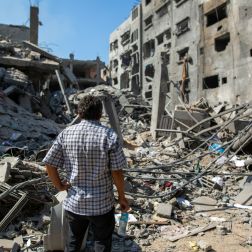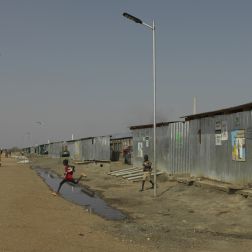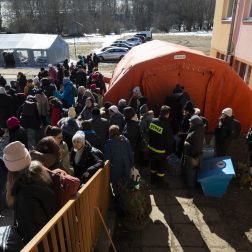
Piece by piece, Israel is systemically dismantling Gaza as a land that is autonomous and liveable for Palestinians. Its banning of UNRWA today is condemnable and another step in this crime.
- 5 mins read time
- Published: 5th November 2024
UNRWA: What would be the disastrous consequences of Israel's ban?
As of 4 November 2024, Israel has officially notified the United Nations that it cancelled the agreement regulating its relations with the United Nations Relief and Works Agency (UNRWA) since 1967, the country's foreign ministry said on Monday. The news arrives just days after the Israeli parliament voted to ban the UN relief agency for Palestinians. Effective in 90 days, the decision will have disastrous consequences within and beyond Gaza and the West Bank.
“Israel has bombed Palestinians to death, maimed them, starved them, and is now ridding them of their biggest lifeline of aid,”
“Piece by piece, Israel is systemically dismantling Gaza as a land that is autonomous and liveable for Palestinians. Its banning of UNRWA today is condemnable and another step in this crime.”
“The decision will further undermine the ability of the international community to provide sufficient humanitarian aid and to save lives in any safe, independent and impartial way.”— Sally Abi Khalil, Oxfam regional director in the Middle East and North Africa
What is UNRWA?
UNRWA was created in 1949 to provide relief, health, and education services for Palestinians who lost their homes and livelihood following the establishment of the State of Israel in 1948. UNRWA provides essential services and protection to more than five million Palestinian refugees overall across the Occupied Palestinian Territory, Jordan, Lebanon and Syria.
It remains “the backbone of the humanitarian response in Gaza,” according to UNICEF.

“UNRWA runs a range of social services, with over 18,000 employees in Gaza and the West Bank, including East Jerusalem, providing health, education and other essential services for Palestinian refugees,” a UNICEF statement reads. “No UN agency can take over this responsibility.”
Is the move legal under humanitarian law?
The United Nations views Gaza as Israeli-occupied territory, and international law requires an occupying power to agree to relief programmes for people in need and to facilitate them "by all the means at its disposal."
In a letter, UN Secretary-General Antonio Guterres wrote that article two of the founding UN Charter requires that Israel "shall give the United Nations every assistance" in its work.

The United Nations views Gaza as Israeli-occupied territory, and international law requires an occupying power to agree to relief programmes for people in need and to facilitate them "by all the means at its disposal."
In a letter, UN Secretary-General Antonio Guterres wrote that article two of the founding UN Charter requires that Israel "shall give the United Nations every assistance" in its work.
He cited as another legal issue the Convention on the Privileges and Immunities of the United Nations - adopted by the General Assembly in 1946. Israeli attacks on Gaza have killed hundreds of UNRWA workers so far, making this the deadliest conflict ever for UN personnel. Norway is reportedly putting forward a UN General Assembly resolution to ask the International Court of Justice (the World Court) for an opinion on Israel's obligations – though the court’s opinion is not binding under international law.
What has been the reaction to the move?
In a letter to Israel's Prime Minister Benjamin Netanyahu on Tuesday, UN Secretary-General Antonio Guterres called for UNRWA operations to continue and said Israel cannot use the national law barring UNRWA as "justification for its failure to perform its obligations under international law."
Guterres also said Israel's ban on UNRWA, if implemented, would violate international law, the founding UN Charter and a UN convention adopted in 1946.
Philippe Lazzarini, UNRWA's commissioner general, warned against the ban:
“These bills will only deepen the suffering of Palestinians, especially in Gaza where people have been going through more than a year of sheer hell,” he said in a statement, adding that the Israeli law “sets a dangerous precedent”.

Philippe Lazzarini, UNRWA's commissioner general, warned against the ban:
“These bills will only deepen the suffering of Palestinians, especially in Gaza where people have been going through more than a year of sheer hell,” he said in a statement, adding that the Israeli law “sets a dangerous precedent”.
What would the consequences be?
Shutting down the main lifeline for Palestine refugees in Gaza would be catastrophic. Gaza’s 2.3 million people rely almost entirely on humanitarian aid for survival, especially now that over 90 per cent has been displaced by Israeli bombardment.
“UNRWA is indispensable in delivering the urgent, life-saving assistance in Gaza,” UNICEF said. “With the children of Gaza already facing one of the gravest humanitarian crises in recent history, if fully implemented, this decision will be deadly.”
Criminalising humanitarian aid goes against ICJ orders to prevent genocide of the Palestinian people.
UNRWA was not only the biggest and most established agency that has been delivering aid and sustenance to the people of Gaza for years, it was also a thread that connected them in some hope of solidarity and security to the United Nations.
We are in no doubt that Israel and its allies are fully aware of the terrible consequences that this decision will have on Palestinians living in Gaza, many of whom are already starving. We join others in warning again that this will result in more death, more suffering, and more forced displacement of people from their besieged homeland. It is impossible not to believe that this is their aim.— Sally Abi Khalil, Oxfam’s Middle East and North Africa Director.
.




